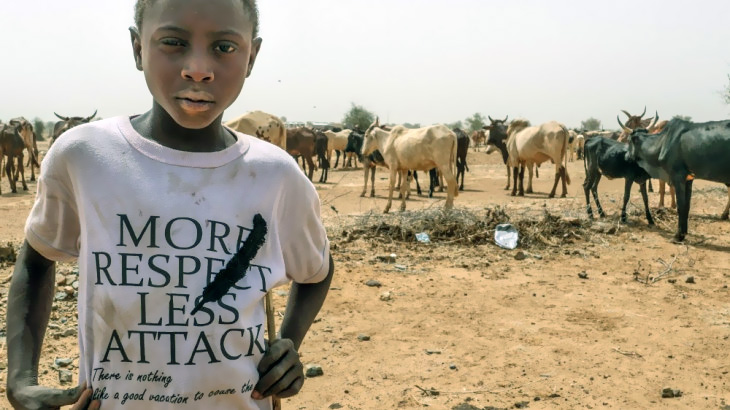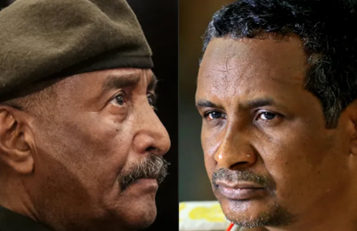Negotiations in the Central Sahel Region

The Central Sahel region includes several hotspots of instability and violence that have been on the rise for at least five years, with mounting numbers of dead, wounded and displaced people as a result of or during military operations in Mali, Burkina Faso and Niger…
Moktar Aoufa
1. Introduction
The Central Sahel region includes several hotspots of instability and violence that have been on the rise for at least five years, with mounting numbers of dead, wounded and displaced people as a result of or during military operations in Mali, Burkina Faso and Niger. For the first nine months of the current year, UNHCR gives the following statistics:
• 4,277,577 refugees or internally displaced persons
• 2.4 million IDPs, 1.42 million of whom are in Burkina Faso alone
• 292 incidents causing 650 deaths and large numbers of injured
Responsibility for this repulsive violence lies with many and varied armed individuals, in addition to the non-state armed groups represented by jihadist offshoots such as Jama’a Nusrat ul-Islam wa al-Muslimin (JNIM), Ansar al-Islam and the Islamic State in the Greater Sahara (IS-GS). There are also state armies: Operation Barkhane by the French army, Takuba created and funded by the Europeans, the Joint Force of the Five Sahel countries (G5 Sahel Joint Force), as well as smugglers, bandits and various popular militias.
In Mali, since 2017 there have been talks on negotiating with armed groups during the National Reconciliation Conference and various other national meetings. But the policy of demonizing these groups in the official media sat uncomfortably with the implicit recognition that might be a necessary element of negotiation, quite apart from France’s repeated rejection of any kind of contact with “terrorists”.
However, such negotiation has become an even more urgent need after the failure of seven years of military operations to eradicate the phenomenon. We might well recall that when the Serval force arrived in Badaliya in 2013, only the north of Mali was affected. Now the armed conflict has spread throughout the entirety of Malian territory, several states in Burkina Faso and two states in Niger. There is much talk about the threats facing Cote d’Ivoire, Benin, Senegal, Togo, Ghana and other countries. Anti-French sentiment is also growing at an astonishing speed among the population, especially the younger generations among the inhabitants of these regions.
However, the French authorities know how to turn a blind eye, pretending that they have received no information on negotiations, especially when awaiting tangible returns from them. In October 2020, for example, the Malians negotiated through the politician Ahmed Ag Bibi and reached an agreement with JNIM to free the last French hostage in the region at that time, Sophie Petronin, and Malian opposition politician Soumaïla Cissé, in exchange for the release of more than 200 fighters languishing in Bamako prisons.
2. Why is negotiation taking place?
Countries never choose to negotiate with what they call in their official media “bandits, terrorists, foreign mercenaries…and so forth” until threatened to their very core. Generally, this negotiation occurs for three main reasons:
First, if there is no probable prospect of overcoming the rebels. After years of military campaigns, the government forces begin to fear defeat, which will inevitably lead to the collapse of the regime and the downfall of the existing government. It is known that the goal of the regular armies is the final elimination of the rebellion, and actual victory can only be achieved at that price. As for the rebel fighters, their goal is to continue to provide convincing evidence of their presence on the ground, regardless of the methods they use to achieve that goal and no matter how crude the efforts involved. To achieve this goal, it is sufficient, for example, to detonate a hand grenade in a crowded street. This incident will convince observers of the ability of the non-governmental armed group to cause damage, showing that it is still strong and has not yet been eliminated. There is no doubt that this asymmetry of objectives and difference in the means deployed has a negative impact on the morale of the armies. Tactical victories achieved by government forces, such as eliminating leaders, arresting some fighters, eliminating bases, etc., do not necessarily lead to the actual defeat of the insurgents.
Second, if the cost of war in terms of men and money becomes exorbitant, increasing year on year, with worsening social and economic repercussions for the civilian population.
Third, if the political call for a return to peace and tranquility becomes a powerful demand backed by a majority drawn from all elements of society.
3. Negotiate at a slow pace
In 2017, the National Reconciliation Conference in Mali recommended that the government “establish a permanent mechanism for dialogue among all Malian citizens on issues of peace and reconciliation.” (1)
In 2019, the “comprehensive national dialogue” in the country that brought together the most important national actors called for negotiations with all Malians, including the two leaders Iyad Ag Ghali and Amadou Koufa (2). The fifth axis of the “transitional road map” mentioned these recommendations and suggested opening a dialogue with the radical armed groups. The prime minister during the transitional period, Mokhtar Ouane (3), made it clear that his government was determined to move forward with the negotiations initiated by former President Ibrahim Boubacar Keita before he was overthrown.
In October 2021, the second government in the transitional period announced that the High Islamic Council of Mali had been assigned to open negotiations with non-state armed groups. This news was met by an official denial just a few days later (4).
It should be noted that in July 2020, in Mopti state, representatives of the local authorities in several townships of Koro (Adiungani – Adiankabo – Mado – Pampa – Yoro – Paraberle) and Bandiagara (Sangha) directly negotiated a municipal peace and reconciliation agreement with the Macina Liberation Front and the IS-GS.
In the Anyono region (Sego state), efforts made to solve the problem of the village of Farabogo – besieged by jihadists from the Kurmani region since October 2020 – witnessed the participation of representatives of the High Islamic Council of Mali and members of rural groups in the region along with non-state armed groups.
In presenting his general policy before the assembly, the prime minister of Burkina Faso stated that the country’s authorities had changed their position on negotiations (5) – until recently, the Burkinabe government had adamantly rejected any kind of negotiation with non-state armed groups. Apparently, tensions have eased in the Soum province (Sahel region). It is possible that the lack of major operations during the run-up to and during the presidential elections followed a secretly negotiated truce.
Based on these official positions, and despite the French position rejecting negotiations, there is discussion on reconciliation agreements aimed at reducing mass violence and local tensions, under the auspices and facilitation of international non-governmental organizations such as the Centre for Humanitarian Dialogue, Geneva Call and Promediation. These local initiatives are still taking shape, with limited room for manoeuvre, and lack coordination. Nevertheless, they demonstrate that efforts to establish and consolidate peace do generate spaces for negotiation and support the search for peace and local governance.
The only country that has not yet taken a position on negotiating with these “terrorists” is Niger, and it is useful to recall that this country was maintaining circumstantial relations with a youth group in Touloubi, in the north of Tillabéri, who started to rebel in 2014. They joined the IS-GS and changed their methods completely. At the end of 2018, this group killed a government envoy who came to negotiate the release of an American hostage (6), and since that date direct contact with it has ceased, having been replaced by messages carried by religious and traditional figures.
It is possible that the appointment as special advisor to the Niger presidency of the businessman, Moustafa Ould Limam Chafi – (7) who speaks several local languages and is well-versed in everything that is going on in the Sahel region, and maintains excellent relations with the Islamic circles in the region – may be in preparation for opening negotiations with these rebels, especially after the death of Al-Sahrawi and his deputy.
4. With whom are negotiations to be held?
Negotiating or seeking negotiations should be with the three jihadist groups that are active in the Sahel, namely:
• The Islamic State in the Great Sahara (IS-GS), which was established in 2015 (8);
• Jama’a Nusrat ul-Islam wa al-Muslimin (JNIM) founded in 2017 (9);
• Ansar al-Islam, which started its operations in December 2016 (10).
5. How to negotiate?
In negotiations, states should avoid direct (face-to-face) meetings with armed groups and instead for that purpose select – in a transparent manner – representatives of local groups. Involving the clergy (11), civil society (12), heads of groups (13), – above all youth – implicitly shows to these armed groups not only that they themselves are disturbed by the presence of these armed groups, as well as the operations of the government armed forces, but that the entire population of the country is similarly fed up with them.
If the representatives of the state were able to adopt a dual approach that made them at one and the same time a party and mediator between the parties, they would have succeeded in the first round of negotiations.
Representatives of gatherings and officials charged with directing negotiations should benefit from the specific training on negotiation techniques provided by many international NGOs specialized in the field of mediation. Working sessions that bring together negotiating teams should be organized to adopt a unified strategy and division of roles. It is also recommended that an evaluation be conducted of each round of negotiation, to draw lessons and weigh up what these imply about any mistakes made during the course of negotiation.
In order to kill two birds with one stone, armed groups should appoint one prisoner or several prisoners to represent them in negotiations, and the negotiating state should release them from prison or request their release from another state and transfer them to wherever the negotiations are held.
6. Where does negotiation take place?
The place of negotiation is of great importance because it must take into account the reassurance and tranquility of the participants. Three criteria underpin selection of an appropriate location, namely the security and safety of all participants, the non-disclosure of the identities of the negotiators, especially wanted individuals, and physical ease of access to it for everyone: and ease of departure from it.
There are three places where most of these criteria are met: Ghana, Qatar and Saudi Arabia.
• Ghana is a stable country open to all West African nationals without a passport and its security forces are among the least corrupt in the region, and ECOWAS citizens enter and leave without problems or harassment.
• The State of Qatar: a country open to Islamists from all currents, with easy entry for everyone, liberal, up to a point, having recently hosted negotiations between the United States and the Islamic Emirate of Afghanistan.
• Saudi Arabia: its activities cover groups of Hajj pilgrims from all over the world throughout the year, and armed groups rarely turn down any invitation to go to this country.
7. What is being negotiated?
During group activities, six topics should be prioritized:
1. The status of Islam in the modern state (personal status, education, justice);
2. Property (real estate/land) reform;
3. Basic services (health, education, water, electricity, transportation, roads, security);
4. Regulating access to mineral, vegetable and fish resources;
5. Federal system or other system of parties/entities;
6. Return to peace (transitional arrangements, detainees, hostages, etc.).
These topics show how important it is for local groups to come to the negotiating table to defend their convictions and interests, express their aspirations, and choose the general orientation that will govern their lives.
The issue of Islam and its place in the societies of the Sahel region will raise an array of widely divergent opinion. But the solution may lie in the form of the state system (a system of parties/entities, or a federal system), which enables each entity to choose its justice system, its schools, its personal citizenship status, and the forms, orientations and frameworks that suit it instead of introducing a single, generalized system that encroaches upon particular interests or imposes restrictions they will not accept.
The issue of real estate reform will also raise a lot of problems and controversy, because the current situation has prevailed for two centuries and undoubtedly represents for some groups a grievous wrong that feeds feelings of resentment, injustice and frustration and inevitably leads to armed conflict. An individual’s belonging to this or that class determines his rights – or lack of rights – to access agricultural land and to control its use.
Other topics relate mainly to the problems of underdevelopment and poor governance. These are amenable to primary solutions that entail the rational adoption of a system of parties/entities, or the explicit adoption of a federal system.
Within large sectors of the Sahel region the absence of the state, and its development projects, is one of the reasons for the population’s rapprochement with armed groups; in addition to the extortion and violations they are exposed to by the armed forces and state agents. These practices are often the cause of the rebellion of the population and constitute the most fertile soil for the development and growth of extremist ideology in groups in the Sahel region.
Disputes between neighbouring groups were resolved through intervention by traditional parties. But the matter became complicated after the intervention of the state, wealthy smugglers and politicians (14), and thus these traditional mechanisms of mediation were bypassed and the disputes were resolved by new forces that had no control over them. The only defence option remaining to these weak adversaries was to deploy bullying by other groups, and in fact use these groups as an offensive weapon for attack if necessary. For example, the Touloubi Fulani groups in the north of Tillabéri joined the Malian armed groups to fight off attacks by groups looting their animals. They trained them to carry arms, equipped them with Kalashnikovs, and they were able to stand up to the looting group.
In conclusion, the negotiation approach, like the security approach, may not be able to end the conflict, but it will excise from the conflict broad groups of young people who were motivated only by objective and achievable demands, rather than a monolithic and elusive conviction-based struggle.
Moktar Aoufa
Notes and References
(1) https://sahelresearch.africa.ufl.edu/files/CEN_dialogue-national-au-Mali-1.pdf
(2) https://www.rfi.fr/fr/afrique/20191222-mali-dialogue-national-inclusif-acheve-quatre-resolutions
(6) Humanitarian agent Jeffrey Woodke, kidnapped in the Niger town of Abalak in October 2016.
(7) Moustapha Limam Echavi’i appointed special advisor to Niger’s president – Kassataya Mauritania
(8) This group has recently lost its leader and deputy.
(9) The group’s officials are Ayad Ghali and Hamdo Kova, who are Malians.
(10) The person responsible for this group is Malam Jaafar from Burkina Faso.
(11) The High Islamic Council of Mali, which has previously proven its worth, must be involved in all negotiations, especially its former president Sheikh Mahmoud Dicko, and all the Sahel countries have organizations capable of playing this role, although to date they are still marginalized.
(12) Involve representatives of all sensitivities of civil society and not remove those who belong to the opposition because armed groups are aware of everything that is going on in the country and will see a failure to include everyone as indicative of some kind of failure to take the whole issue seriously.
(13) Many young people from Salafist circles in society are rebelling against traditional leaders and no longer follow their orders and these young people must be included.
(14) In 2018, Mr. Sisi, a retired teacher and respected figure in the town of Mopti, told us that local groups were trying to resolve differences between neighbours and local authorities without recourse to Bamako politicians who tend to exploit these differences for their political ends rather than contributing to their resolution.










